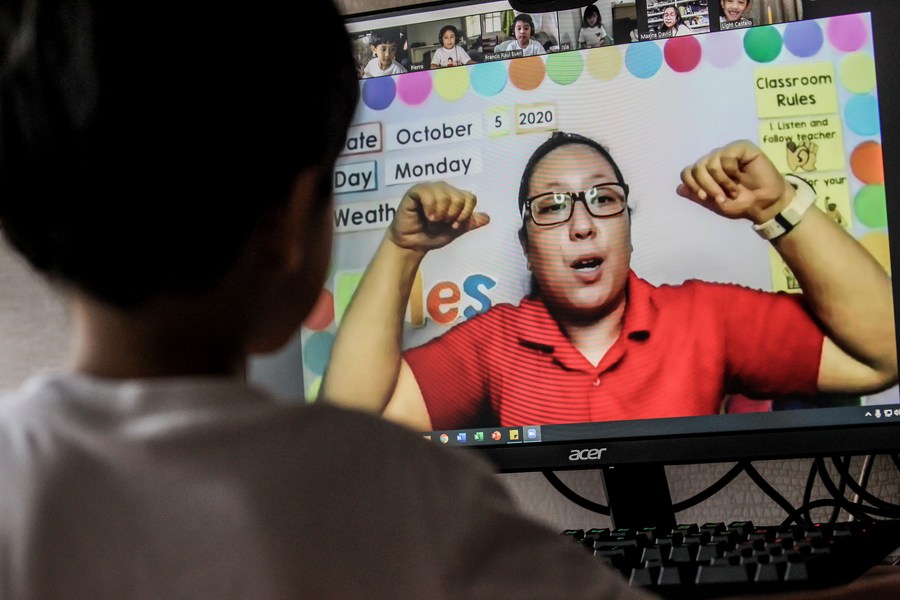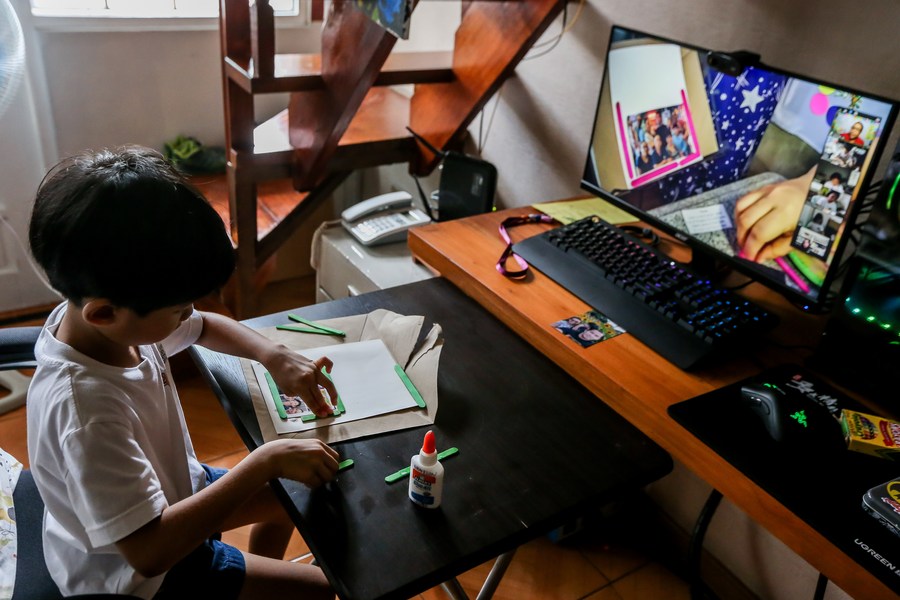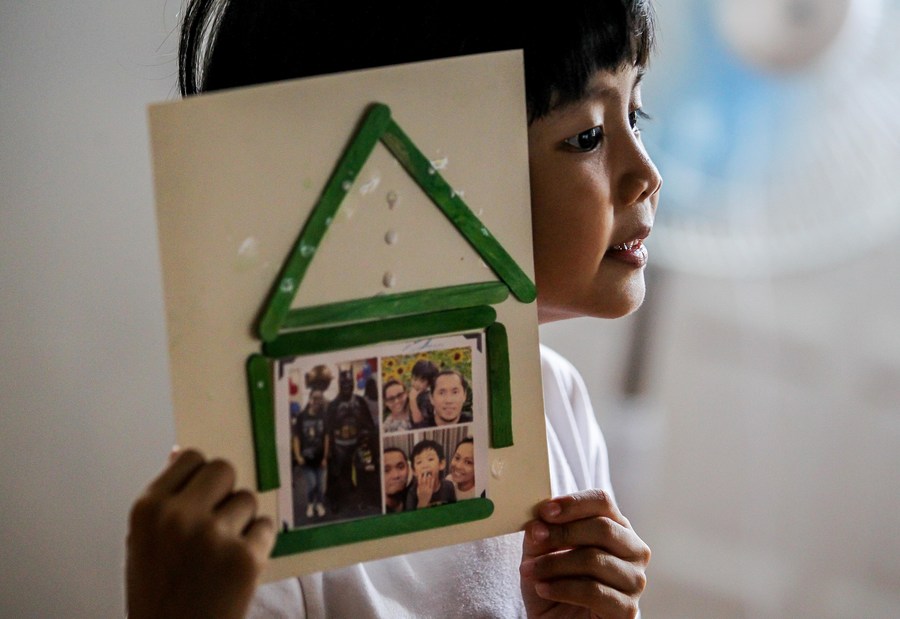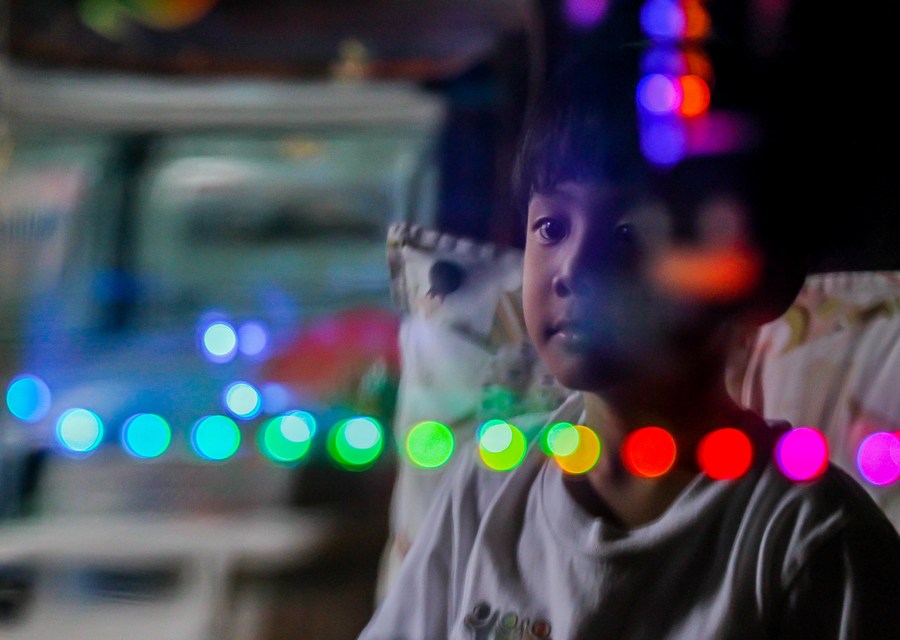
Five-year-old Grayson Lucas attends an online class at home during the first day of school in Manila, the Philippines, on Oct. 5, 2020. (Photo by Rouelle Umali/Xinhua)
At least 22.5 million public school students in the Philippines started school on Monday amid the COVID-19 pandemic, with the new modes of distance learning posing challenges for some students due to the lack of gadgets and internet connectivity.
MANILA, Oct. 6 (Xinhua) -- "Let the classes begin!"
Leonor Briones, education secretary of the Philippines, on Monday officially declared the start of School Year 2020-2021 on Monday. At least 22.5 million public school students in the Philippines started school on the day.
However, the COVID-19 pandemic had made this year's school life different.
Since this March, COVID-19 has resulted in schools shut, forcing students out of the classroom and to carry on distance learning in this country. As of Monday, the Philippines' cumulative count of COVID-19 cases climbed to 324,762, the highest in the Southeast Asian region.
The Philippine government planned to kick off the start of online opening of over 47,000 public kindergarten, elementary and secondary schools across the country on Aug. 24. However, the school opening schedule was moved to Oct. 5 because of the rapid growth of the COVID-19 cases then.
Now even as the school year finally opens, most students and teachers won't appear in the schoolyards. The Philippines has shifted to distance learning following President Rodrigo Duterte's directive for schools to delay face-to-face classes until a COVID-19 vaccine becomes available.

Five-year-old Grayson Lucas attends an online class at home during the first day of school in Manila, the Philippines, on Oct. 5, 2020. (Photo by Rouelle Umali/Xinhua)
Distance learning is when teachers and students are geographically remote from each other during their classes. This means lessons are delivered outside the traditional face-to-face set-up, through a mix of modular learning, online learning, and TV and radio broadcasts.
"Education must continue; we should strive harder despite the challenges," Briones added.
Weeks before the opening of classes, teachers scrambled to print and distribute the self-learning modules on time. Some teachers crossed rivers and mountains to distribute the self-learning modules to remote villages.
Parents need to pick up the modules each week or every two weeks and return the activity sheets of the students.
The country's education department has prepared 3,120 video lessons and episodes, and 3,445 radio scripts per episode to be aired in 207 TV channels and 162 radio stations nationwide.

Five-year-old Grayson Lucas shows his work during an online class at home on the first day of school in Manila, the Philippines, on Oct. 5, 2020. (Photo by Rouelle Umali/Xinhua)
"That will supplement the instruction online, or in the case of those without access to gadgets, to the internet, the self-learning modules," Education Undersecretary Tonisito Umali said.
However, concerns persist on the accessibility of the new modes of learning. A slow internet connection and the lack of gadgets hamper the learning of some children.
Eric Rapadas, 14, is a consistent honor student of a public high school in Albay province, south of Manila. But his parents -- a tricycle driver and a department store employee - cannot afford even to buy a second-hand laptop that he can use for his online classes.
Her mother, Inday, is worried that her son's interest in studies will wane because of a lack of gadgets. "My son's average is 90 last school year. I don't want him to lose interest in school just because he does not have the proper gadget," she told Xinhua.

Five-year-old Grayson Lucas attends an online class at home during the first day of school in Manila, the Philippines, on Oct. 5, 2020. (Photo by Rouelle Umali/Xinhua)
Furthermore, internet connectivity is another challenge for students. "We will be flexible. We can shift to other distance learning modality like self-learning modules or radio or TV in case the internet connection is spotty," Umali said.
Self-learning modules will be made available in print or digital formats, Umali added.
Duterte said Monday's school opening is a "momentous" event.
"The school opening of this year is a momentous occasion because it is pushing through despite a global health crisis due to COVID-19," Duterte said in a pre-recorded message aired Monday.
"Indeed, nothing can get in the way of the instruction and formation of our learners, not even a pandemic," he added. ■



